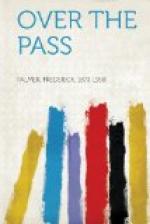“Foolish business, Jack!” she answered.
“Or drag a plow.”
“Very hard work!”
“Or set out to tunnel a mountain single-handed, with hammer and chisel.”
“I think you would find it dreadfully monotonous at the end of the first week.”
He had spoken his extravagances without winning a glance from her. She had answered with a precision that was more trying than silence.
“I shouldn’t find it so if you were in the neighborhood to welcome me when I knocked off for the day,” he declared. “You see, I can’t help it. I can’t help what is in me, just as surely as the breath of life is in me.”
“Jack!” she flashed back, with arresting sharpness, but without looking around, while her step quickened perceptibly, “suppose I say that I am sorry and I, too, cannot help it; that I, too, have temperament, as well as you;” her tone was almost harsh; “that even you cannot have everything you command; that for you to want a thing does not mean that I want it; that I cannot help the fact that I do not—”
With a quick interruption he stayed the end of the sentence, as if it were a descending blade.
“Don’t say that!” he implored. “It is too much like taking a vow that might make you fearfully stubborn in order to live up to it. Perhaps the thing will come some day. It’s wonderful how such a thing does come. You see, I speak from experience,” he went on, in wan insistence, with the entrance to the hotel in sight. “Why, it is there before you realize it, like the morning sunshine in a room while you are yet asleep. And you open your eyes and there is the joyous wonder, settling itself all through you and making itself at home forever. You know for the first time that you are alive. You know for the first time that you were born into this world merely because one other person was born into it.”
“Very well said,” she conceded, in hasty approval, without vouchsafing him a glance. “I begin to think you get more inspiration for compliments on this side of the pass than on the other,”—and they were at the hotel door. Precipitately she hastened through it, as if with her last display of strength after the exhaustion of that walk.
XXXI
PRATHER WOULD NOT WAIT
When he returned to the house, Jack found a letter that had come in the late mail from Jim Galway:
“First off, that story you sent for Belvy,” Jim wrote. “We’ve heard it read and reread, and the more it’s worn with reading the fresher it gets in our minds. As I size up the effect on the population, we folks in the forties and fifties got more fun out of it than anybody except the folks in the seventies and the five-to-twelve-year-olds. Some of the thirteen and fourteen-year-olds were inclined to think at first that it wasn’t quite grown up enough for them, until they saw what fashionable literature it was becoming. Then their dignified maturity limbered up a little. Jack, it certainly did us a world of good. It seemed as if you were back home again.”




